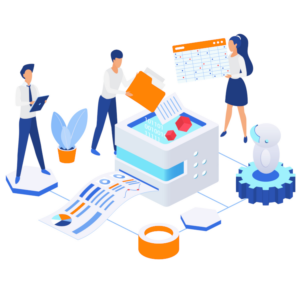The future of your business lies in your data!
Data driven process
In today's business environment, a data-driven approach is a key success factor to enhance operational efficiency, drive innovation, reduce business risk and remain competitive.
A directional data strategy is the cornerstone to generating real value and value for your business from data in all areas. The purpose of a data strategy is to answer the question of how the entire organization can use data to support business decisions.
It is the long-term vision for how data is captured, stored, shared, and used in your organization. It encompasses all the tools, procedures and policies for handling enterprise data and coordinates data analytics, data governance and information architecture. This all occurs with regulatory compliance and security considerations in mind.

It is the long-term vision for how data is captured, stored, shared, and used in your organization. It encompasses all the tools, procedures and policies for handling enterprise data and coordinates data analytics, data governance and information architecture. This all occurs with regulatory compliance and security considerations in mind.
Benefits of an established Data Strategy
Value added
Increase business value through process optimization, efficiency optimization, faster decision-making, improved customer satisfaction, and increased revenue.
Data administration
Consistent data management with high data quality prevents data silos, data duplication, inefficient data flow between business units, and confusion over data priorities.
Analysis
By reaching an analytical maturity level for predictive analytics, we can obtain answers to tomorrow’s questions today.
Innovation
More innovation and better products and services: By analyzing customer data, for example, companies gain a deeper understanding of their customers and can proactively address unmet customer needs. This enables companies to innovate and develop personalized products and services.
Data expertise
Building enterprise-wide data literacy enables employees to make informed decisions for exponential growth.
Our approach: iterative and agile
1
Data assessment
In cooperation with you, we conduct information needs analysis to derive the requirements for your future data analytics system. Simultaneously, we look at the previous approach to reporting with you and determine the gap analysis as part of a maturity assessment and conduct a data screening. We also evaluate relevant data sources and investigate the data quality. If there are still a few approaches to reporting in the company, we first create a data/process map with you.
2
Prototype development
Based on the identified requirements and the data map, we design and develop a prototype or a data pilot application. In this process, we implement some concrete use cases from all requirements, including the information needs. This pilot application is then evaluated with you, including an intensive review of the approach and methodology.
3
Data solution projecting
Drawing on the experience and insights gained from the pilot application, we work with you to plan and project the further development and integration of the solution into your company's IT landscape, including guidelines for release management and deployment processes. In addition, an authorization model for the end users gets designed.
Your start
Data Strategy in your company
The development of a data strategy is not a theoretical treatise, but we take a concrete and practical approach with you. Together with you, we take the steps that will enable your company to successfully handle data. Our three-stage process model has proven itself in many data projects. The implementation duration of the individual phases is based on your actual needs and is thus entirely in line with your individual goals and framework conditions. In doing so, we always proceed in an iterative and agile manner.
